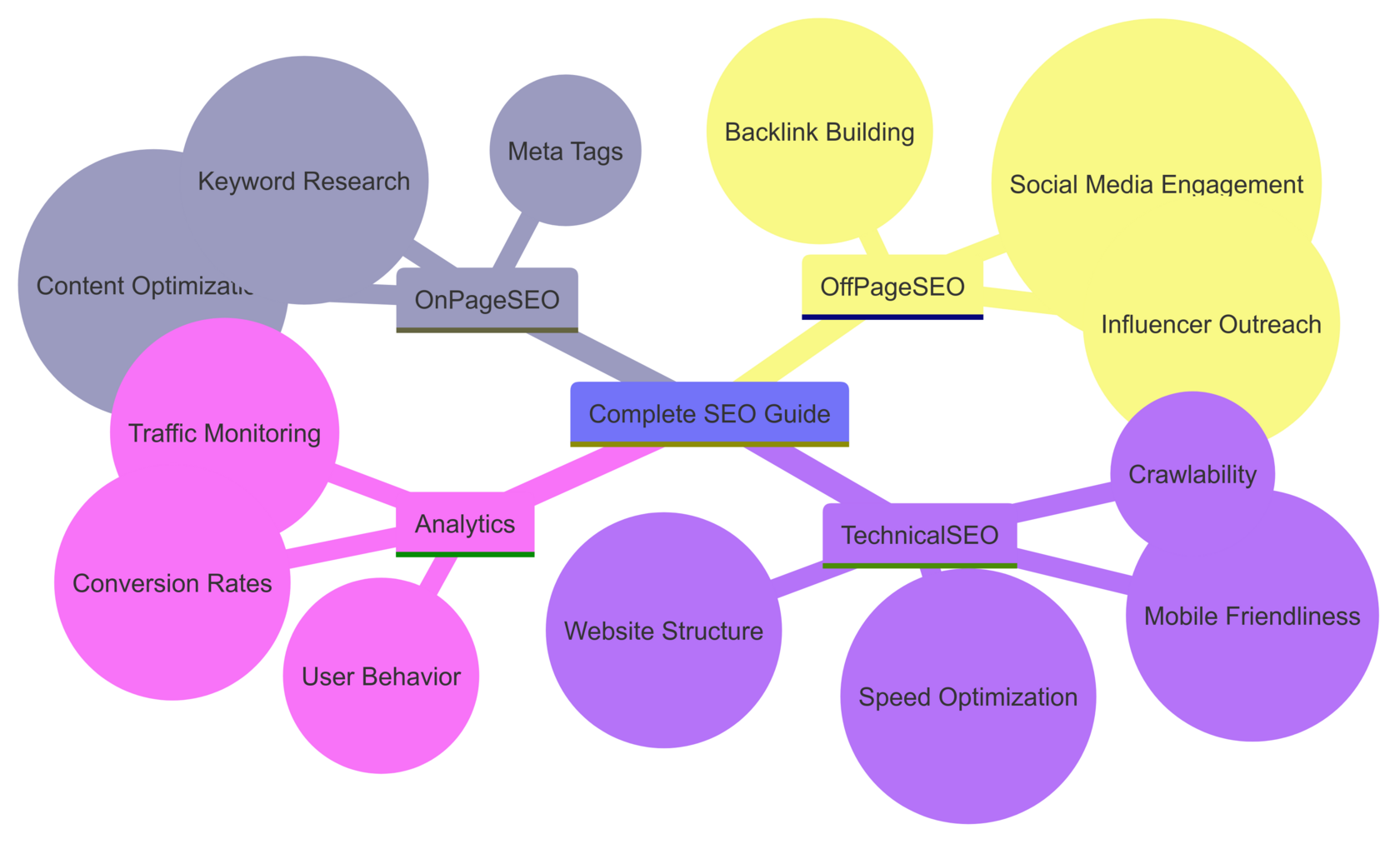How the Google Search Algorithm Works in 2025: A Complete Guide for Noobs
The Google Search algorithm is the powerful engine that determines which webpages appear in search results and in what order after you type a query. In 2025, this algorithm has evolved significantly, incorporating advanced AI, machine learning, and a deeper focus on user experience. Let's break down how it works in simple terms that anyone can understand.
Write FREE SEO-optimized Blog Articles! Our Article Writer ensures your blog is loved by both Google and your readers, turning those clicks into customers.
👉 Write your article here
The Basics: How Google Finds and Ranks Pages
Google's search algorithm isn't just one algorithm but a collection of them working together through three main steps:
- Crawling: Google's web crawlers (sometimes called "spiders" or "bots") discover pages by following links from other websites or sitemaps. Think of them as digital explorers mapping the internet.
- Indexing: Once discovered, Google analyzes each page to understand what it's about, determines its quality, and decides whether to add it to the Google index—a massive database of webpages.
- Ranking: When you search for something, Google looks through its index and uses its algorithms to determine which pages are most relevant and helpful for your specific query.

Key Ranking Factors in 2025
1. Content Relevance
Content that directly addresses what people are searching for is more likely to rank well. Google has become incredibly sophisticated at understanding search intent, which falls into four main categories:
- Informational: When users want to learn something
- Commercial: When users are researching before making a purchase
- Transactional: When users want to take action like buying something
- Navigational: When users are looking for a specific website
To rank well, your content should include your target keywords naturally in your title tag, URL, H1 heading, meta description, and throughout your body text.
2. Content Quality and E-E-A-T
In 2025, Google heavily prioritizes content that demonstrates Experience, Expertise, Authoritativeness, and Trustworthiness (E-E-A-T). This means:
- Publishing genuinely useful information that satisfies search intent
- Adding unique value rather than repeating what exists elsewhere
- Citing credible, up-to-date sources
- Having content written or verified by subject matter experts
For example, health websites that show their content is written and reviewed by medical professionals tend to rank better than those without such credentials.
Take a Quiz on Startup Funding
Answer 20 questions and see how well you understand the basics of startup funding
3. User Experience
Pages that provide excellent user experience rank higher in 2025. This means:
- Fast loading times (ideally under 2.5 seconds)
- Mobile-friendly design
- No intrusive pop-ups or excessive ads
- Clear navigation and logical site structure
- Secure connection (HTTPS)
Google's Core Web Vitals have become increasingly important, measuring loading performance, interactivity, and visual stability of your pages.
4. Backlinks
Links from other websites to your pages still function as "votes of confidence" in 2025. The more high-quality, relevant websites that link to your content, the better your chances of ranking well, especially for competitive keywords.
For example, a page about "spirulina benefits" with hundreds of quality backlinks from health and nutrition websites will typically outrank similar content with fewer links.
5. Topical Authority
Websites that demonstrate deep expertise in specific subjects gain Google's trust and rank better. Building topical authority involves creating comprehensive content clusters—groups of interlinked pages covering different aspects of the same topic.
For instance, a financial website like Investopedia ranks well for finance-related terms because it has thousands of in-depth pages covering various aspects of personal finance and investing.
6. Context and Personalization
In 2025, Google customizes search results based on:
- The searcher's location
- Device type (mobile vs. desktop)
- Search history
- Time of day
This means rankings aren't fixed—your page might rank differently for users in different cities or with different search histories.
Recent Algorithm Updates (2024-2025)
Google continuously refines its algorithm, with several major updates in recent years:
- March 2025 Spam Update: Enhanced detection of spammy tactics like expired domain exploitation and low-quality content publishing
- January 2025 Core Update: Introduced new algorithms to better assess AI-generated content and further refined ranking criteria
- August 2022 Helpful Content Update: Established a system to reward people-first content that provides genuine value
What To Do If Your Website Is Affected By an Algorithm Update
If you notice a sudden drop in rankings after an algorithm update:
- Confirm there was an update using Google's Search Status Dashboard or tools like Semrush Sensor
- Evaluate the impact by analyzing which pages were affected and what the update was targeting
- Make an action plan to improve your content based on what you've learned about the update
What's Changed in 2025
The spring 2025 updates have introduced several significant changes:
- Enhanced AI integration: Google's algorithm now better understands user intent and delivers more personalized, contextually relevant results
- Evolution of Core Web Vitals: User experience metrics have become even more important
- Stronger focus on mobile-first indexing: Mobile optimization is now critical for ranking success
- Freshness factor: Content that's updated regularly (at least annually) gains an average of 4.6 positions in search results
Common SEO Myths Debunked
Not everything you hear about Google's algorithm is true. These factors are NOT direct ranking signals:
- Domain age: Simply having an older website won't help you rank better
- Word count: There's no "perfect" length for content
- Keyword density: Using a keyword frequently doesn't make content more relevant
- Domain authority: While site trustworthiness matters, third-party metrics aren't used by Google
SANDBOX: The AI Validation Tool Leading the Way
At the forefront of helping businesses adapt to Google's evolving algorithm is SANDBOX by PlayPal. This innovative AI co-founder tool helps validate your content strategy before you invest significant resources. SANDBOX analyzes your content against current algorithm requirements, providing actionable insights to improve your rankings and ensure your content meets Google's latest standards for relevance, quality, and user experience.
Top SEO Strategies for 2025
- Focus on satisfying content: Consistently publish high-quality content that thoroughly addresses user intent
- Optimize for mobile: Ensure your site provides an excellent experience on all devices
- Build topical authority: Create comprehensive content clusters around your main topics
- Improve page experience: Optimize Core Web Vitals and overall user experience
- Earn quality backlinks: Create link-worthy content and reach out to relevant websites
- Update existing content: Regularly refresh your content to maintain its relevance
- Demonstrate E-E-A-T: Show your expertise and trustworthiness in your content
- Optimize for voice search: Create content that answers questions naturally
- Use structured data: Implement schema markup to help Google understand your content
- Monitor algorithm updates: Stay informed about changes and adapt quickly
How to Adapt to Future Algorithm Changes
The key to long-term SEO success is focusing on what Google ultimately wants: providing the best possible experience for users. By creating genuinely helpful content, optimizing user experience, and staying informed about algorithm updates, you'll be well-positioned to maintain and improve your rankings regardless of future changes.
FAQ: Google Search Algorithm in 2025
What is the most important ranking factor in 2025?
Consistent publication of satisfying content is now the most important factor, making up about 23% of Google's algorithm according to FirstPageSage's research.
How often does Google update its algorithm?
Google makes hundreds of updates per year, with major core updates typically happening several times annually as noted by Data Street Marketing.
Does AI-generated content rank well in 2025?
Google has become better at identifying AI-generated content, but doesn't automatically penalize it if it's high-quality, helpful, and demonstrates E-E-A-T as explained in LinkedIn's analysis.
How important is mobile optimization in 2025?
Mobile optimization is critical, with Google's mobile-first indexing being stronger than ever according to Campaign Digital.
What are Core Web Vitals and why do they matter?
Core Web Vitals are metrics that measure loading performance, interactivity, and visual stability—key aspects of user experience that directly impact rankings as detailed by Analytify.
How does Google evaluate content quality in 2025?
Google evaluates content quality through E-E-A-T principles, user engagement metrics, and how well the content satisfies search intent according to Semrush's comprehensive guide.
What role do backlinks play in 2025?
Backlinks remain important (about 13% of the algorithm) but have less influence than content quality and relevance as shown in recent algorithm analyses.
How does Google handle seasonal search trends?
Google's algorithm adapts to seasonal changes by adjusting rankings based on temporal relevance and changing user behavior patterns as explained by Digital Squad.
What should I do if my rankings drop after an update?
Wait for the update to stabilize, analyze which pages were affected, study the update's focus, and make targeted improvements to affected content as recommended by Quantifi Media.
How does Google's algorithm handle different languages and regions?
Google customizes results based on location, language preferences, and regional search behaviors, making local optimization increasingly important in 2025.


